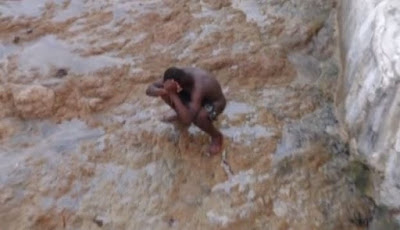Open defecation: Tourists vow never to swim in Ghana’s ocean
Ghana will have to intensify the fight against open defecation or risks losing tourists which may eventually lead to the collapse of the tourism industry in the country.
This is because, tourists visiting the country are gradually getting fed up with the insanitary state of most of the tourist sites, particularly the beaches.
In a report by JoyNews’ Joojo Cobbinah, tourists who visit the historical Cape Coast Castle in the Central Region have vowed never to go bathing in Ghana’s ocean due to the indiscriminate practice of open defecation along the shores of the beaches.
Residents around the Cape Coast Castle, including fishermen who incidentally seek their livelihood from the same spot have turned the seaside behind the castle into an open defecation ground.
They ease themselves in the water and use same water to wash their anus even in the presence of tourists.
This act, according to the tourists is unacceptable and must be discouraged.
They advise government to adopt a more pragmatic way of ending the practice and also involve more people to take care of the beaches and other sites in order to attract more tourists into the country.
One of the tourists said, “I had heard of it before coming to Ghana and actually it’s a problem on public basis at public places. I think that kind of behaviour is unacceptable and it is really off-putting. I wouldn’t go swimming or bathing on the beach.”
“I really love swimming and I really love the beach but I just never go to the beach here. Ghana has so many beautiful beaches and good places but to go to swim here …,” another tourist noted.
The Assistant Director of the Cape Coast Castle, however says the activities of residents along the beach is causing embarrassment to guides at the site, hence he bows his head in shame anytime tourists enquire about open defecation at the beach around the Castle.
“In fact it’s difficult to tell them why they’re defecating there because it’s an embarrassment, shameful, disgraceful, distasteful, and therefore, we just try to tell them we have tried our effort to move them away but they will not yield. Diplomats, people of high calibre, you take them around and then you go to meet such situation, you the person taking the visitors round finds it difficult to continue the tour,” he stressed.
Meanwhile, fishermen at the beach admit they engage in open defecation behind the castle and explain that they have fun while doing so.
One of them says, “When I squat at the beach I enjoy fresh air and also the water carries the excreta away.”
Background
In a report released by WaterAid, an international Non-Governmental Organization in its 2017 state of the world’s toilets titled ‘Out of Order’, Ghana was named among the top 10 countries worldwide with the highest percentage of its population without decent toilet facilities.
The absence of proper toilet facilities in most parts of the country, particularly in areas along the coastal belts has over the years led to a conversion of the coastline into a free arena for defecation.
Beaches which are supposed to be places of relaxation for tourists are brimming with pollutants including faecal matter and plastics, among others.
The practice poses a serious threat to the health of citizens and has also become a major disincentive to the growth of the tourism sector as tourists are shying away from patronising the beaches.
A World Bank report also disclosed that, one in five Ghanaians practices open defecation and the practice makes Ghana lose $79 million annually.
In a report released by WaterAid, an international Non-Governmental Organization in its 2017 state of the world’s toilets titled ‘Out of Order’, Ghana was named among the top 10 countries worldwide with the highest percentage of its population without decent toilet facilities.
The absence of proper toilet facilities in most parts of the country, particularly in areas along the coastal belts has over the years led to a conversion of the coastline into a free arena for defecation.
Beaches which are supposed to be places of relaxation for tourists are brimming with pollutants including faecal matter and plastics, among others.
The practice poses a serious threat to the health of citizens and has also become a major disincentive to the growth of the tourism sector as tourists are shying away from patronising the beaches.
A World Bank report also disclosed that, one in five Ghanaians practices open defecation and the practice makes Ghana lose $79 million annually.




Comments
Post a Comment